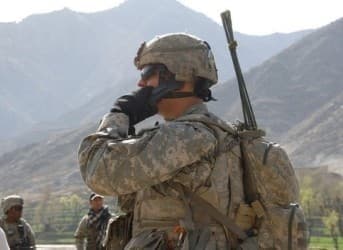A lot has happened in Afghanistan in recent days intrinsic more to geopolitics than to Afghanistan itself: Russia-US joint anti-drugs operations are in being put in full swing, Russia has offered up Ulyanovsk for NATO’s Afghan transit needs, and both Beijing and Moscow have been asked to contribute financially to Afghan security forces.
Following a two-day NATO-Russia summit that ended on 19 April, Russia agreed to allow NATO’s ISAF troops to use its rail network and air transport running through the town of Ulyanovsk to send supplies in and out of Afghanistan. Specifically, the deal would allow for the opening of a NATO transit hub in the town, which is situated on the Volga River and is a convenient route to Europe. Ideally, NATO would be able to use air transport to fly goods from Afghanistan to Russia and then Russia’s rail network to move those goods on to Europe.
This is an important deal for NATO, which can longer rely on Pakistan for supply routes. The Pakistani supply route has long been a point of contention between Islamabad and NATO, and the route, which carried as much as one-third of ISAF’s Afghan equipment, has been attacked and cut off several times in the past. Most recently, a NATO cross-border air strike in November killed 24 Pakistani soldiers and Islamabad responded by closing the route indefinitely.
Nor can NATO rely on its Northern Distribution Route through Central Asian countries. The US has signed agreements with Central Asian nations to bring supplies in and out of Afghanistan, but those agreements have not been fully implemented while Uzbekistan in particular is holding out to hedge its bets for higher transit fees. (The Russian agreement may stifle Uzbek greed.)
Russia is interested in the US withdrawing its forces, but it is also interested in stability in Afghanistan, and concerned that the withdrawal is being undertaken without the proper security in place. But the withdrawal is more of a downsizing, and a key concern for both Russia and NATO is energy security. Energy security is one of NATO’s key, although ill-defined, roles. NATO’s military operation in Afghanistan has increased exponentially the significance of the Caspian region in terms of energy security.
Most likely, as many as 30,000 troops will remain in Afghanistan beyond 2014, stationed along a key planned pipeline route – the $7.6-billion Turkmenistan-Afghanistan-Pakistan- India (TAPI) pipeline project – though the success of this endeavor is increasingly under question.
NATO stands the risk of being perceived as pursuing a military energy security policy, which could hinder efforts toward security cooperation over transnational issues threatening Russia as well as NATO countries, such as terrorism and drugs.
While energy security and pipeline politics related to Afghanistan and the Caspian region remain contentious issues between Russia and NATO, drugs in particular has proven a solid platform for cooperation.
Russian and US special services have been conducting joint anti-drug operations in Afghanistan for the past year, and the results of those operations, aimed primarily at destroying drug laboratories, will be revealed in May at a bilateral anti-drug conference in St. Petersburg.
So where does this leave China?
“We would welcome financial contributions from Russia, China and other countries to ensure a strong, sustainable Afghan security force beyond 2014″, NATO Secretary-General Anders Fogh Rasumssen told reporters after the Thursday summit in Brussels. This is not likely to be forthcoming, particularly from Beijing.
ADVERTISEMENT
China’s economic interest in Afghanistan is significant, but Beijing has steadfastly refused any involvement beyond economic development and the exploitation of natural resources. Still, China could be an influential component, especially given its close ties to neighboring Pakistan. But Beijing is also pragmatic, and its perception of Afghanistan for now is that the Taliban has managed to infiltrate the country on all levels. This includes security, for which it is being asked to contribute financially.
By. Charles Kennedy for Oilprice.com



















Once NATO leaves Afghanistan there is likely to be open conflict beteween the Taliban and the Northern Alliance/Uzbek-Tajik based Afghan Army i.e. a civil war.
This will be financed by both Saudi and Iran as a proxy war.
The Russians want to make sure that TAPI doesn't conflict or compete with their oil/gas export network so it pays them to get into Afghanistan and control the situation from within with regards to that.
Many Afghans of the former ACP still connect with Russia.
When NATO leaves there will still be a mess. And it will be the Russians, Iranians, Chinese, Saudis, Indians and Pakistanis who will be embroiled with it. The West will be merely an onlooker.